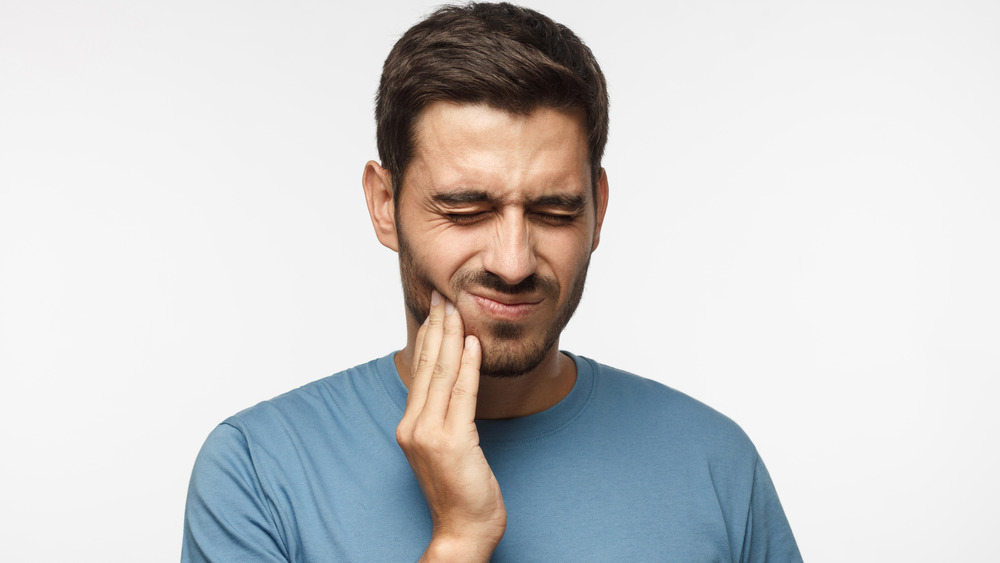Your Posture Affects Your Health In More Ways Than You Think
Is your posture making you unhealthy? It certainly can, but the good news is that quitting this bad habit is possible at any time. Physical signs of poor posture include a "hunchback" (a forward rounding of the upper back) and a forward head position, in which the head leans forward, putting stress on the neck joints (via Healthline).
But what even is posture? Simply put, it's the position you hold while standing, sitting down, and even while lying down. Good posture is vital to your health, much like diet, sleep, and exercise. According to Harvard's Healthbeat, good posture when sitting involves having your "chin parallel to the floor" along with even shoulders, hips, and knees, with your knees and feet pointing forward.
"Good posture is important to balance: by standing up straight, you center your weight over your feet," according to Healthbeat. Maintaining proper posture also helps to ensure bones, muscles, and ligaments are aligned correctly and evenly. Also, good posture keeps body parts in their right places with minimal discomfort. Want to know more about good and, well, not-so-good posture? Keep reading to learn about the many effects of posture on your health.
Poor posture leads to and worsens arthritis
Poor posture can affect the alignment of your spine, causing increased stress on your joints. According to the Cleveland Clinic, it can actually force you to overwork your neck and back muscles. This will set off an immune response. "Your immune system's efforts to heal those muscles spur inflammation that — over time — can lead to arthritis in nearby joints," the clinic explained.
Poor posture can be a problem for people with knee arthritis, in particular. Dr. Chris Wolf, a sports and regenerative orthopedic specialist from Chesterfield, Missouri, told U.S. News & World Report, "Over time, that malalignment can worsen the effects of arthritis by putting pressure on one part of the joint and causing pain. The pain can decrease your overall function and quality of life."
Unfortunately, posture may worsen with age and affect balance, a 2013 study in BMC Geriatrics revealed. And according to a cohort study published in the same journal in 2017, fall risk in older adults has been connected to both fall efficiency (perceived confidence in performance of daily tasks) and postural balance. Here, researchers examined the interaction between both aspects and their connection to future falls. The researchers suggested poor postural balance could increase fall risk in older adults, especially if a person has "gait [walking] limitations."
Poor posture affects circulation and oxygen levels
When you are slouching — as one does while scrolling on their phone — pressure is put on your lungs, which "significantly reduces lung capacity [and] expiratory flow," a 2016 study in Journal of Physical Therapy Science revealed. According to a 2018 systematic review in the journal, BMC Pulmonary Medicine, body position can influence the results of pulmonary function tests.
Although you might not think much of the way you're sitting, your posture could just be responsible for a reduction in how much oxygen gets to tissues throughout your body. Poor posture can even lead to poor circulation, aka inadequate blood flow, according to Corner Chiropractic Care of California. And poor circulation can lead to high blood pressure, varicose veins, and even the way your brain functions (via Medical News Today). It is, therefore, a good idea to take breaks throughout the day and to be mindful of your sitting posture.
Poor posture causes fatigue
Is your posture making your body tired? "When your body isn't in proper alignment, your body works overtime by trying to just function normal," Texas Spine and Sports Therapy Center explained. "Your muscles will tire at a faster rate because they have to work harder, which means you will easily become fatigued and feel a loss of energy." Poor posture can especially affect the back muscles, according to a 2020 report in the journal Frontiers in Physiology. Additionally, continuous bad posture adds tension to the spine and joints, which can lead to pain and more fatigue.
And it's not just your muscles that get tired from poor posture. You, too, might be feeling sleepy. A study reported in 2017 in the Journal of Behavior Therapy and Experimental Psychiatry suggested that an upright posture is vital to improving fatigue in people with mild to moderate depressive symptoms. In the study, all the participants had slouched posture. Some participants were asked to sit in their usual way, while others tried an upright position. Those in the upright position experienced less fatigue.
Posture affects mood
There has been evidence your posture may affect your mood. A 2017 study published in the Journal of Behavior Therapy and Experimental Psychiatry found people with depression who sat upright had experienced improvements in their moods. "This preliminary study suggests that adopting an upright posture may increase positive affect ... and decrease self-focus in people with mild-to-moderate depression," the study concluded.
Additionally, a study published in 2012 in the journal Biofeedback found that something as simple as changing body posture to an upright position can improve mood and energy. The 110 study participants were asked to rate their walking either in a slouched position or "'cross crawl skipping." After a few minutes, study participants rated their energy levels. When walking in a slouched manner, energy decreased. The other position, however, led to significant energy increases. Plus, the poor posture was linked with a poorer self-rating of depression. By changing posture and not slouching, study participants had improvements in both mood and energy. Researchers stressed the mind-body connection and the effect posture can have on it.
Forward head posture is common but bad for the body
Forward head posture, sometimes called "protracted neck," refers to a posture in which the head looks positioned in front of the body (via International Journal of Physiotherapy and Research). It's very common, affecting between 66 to 90 percent of the population, the report highlighted.
According to a 2018 report in the journal Osong Public Health and Research Perspectives, forward head posture increases the strain on muscles located in the cervical spine, which supports your head. "Over time, forward head posture can lead to muscle imbalances as the body tries to adapt and find efficient ways to hold the head up for straight-ahead vision," Spine-Health explained. This might also cause neck muscles to become weak, short, or tight, as the report in Osong Public Health and Research Perspectives found.
Of course, this is one of the many reasons to adjust your posture when needed. "Whether it is while eating a meal, commuting, performing at work, or watching a show, remembering to practice good posture throughout the day can help reduce stress on the cervical spine over time," Spine-Health advised.
Posture is connected to temporomandibular joint syndrome
Temporomandibular joint (TMJ) disorder affects the "hinge that connects your jaw to the temporal bones of your skull," WebMD explained. This condition is called TMD. Interestingly, a study in Clinics found a connection between TMD and poor posture. Yes, TMJ pain might develop because of the effect poor posture has on your head, neck, and shoulders (via Therapydia).
The study in Clinics looked at the connection between global posture (foot arches, legs, pelvic girdle, vertebral spine, shoulders, head, and jaws) and anterior disc displacement of the TMJ. What they found was that disc displacement meant more TMJ pain. Among the people who had disc displacement, there were "postural deviations" in their pelvises, lumbar and thoracic spines, head, and jaws. The study's authors suggested a close relationship existed between body posture and TMD, and that evaluating posture can actually be helpful for both prevention and treatment of the disorder.
Poor posture contributes to breathing pattern dysfunction
Breathing pattern dysfunction refers to abnormal respiratory patterns, especially over-breathing, upper-chest breathing, and hyperventilation, a 2014 study in the International Journal of Sports Physical Therapy explained. Poor posture can contribute to breathing pattern dysfunction disorders often seen in people who sit for long periods of time. "Rounded shoulders and a forward head posture cause the muscles around the chest to tighten," Healthline explained of the condition. "That tightening limits the ability of the rib cage to expand and causes people to take more rapid, shallow breaths."
A 2018 study in the journal BioMed Research International explored the impact of head and neck positions on the respiratory function of 15 healthy men, ages 18 to 35. They found that some head and neck positions had "immediate" effects on respiratory function. The authors noted that it can affect anyone with poor sitting posture, and sitting postures like a forward head posture are becoming more common with the use of different handheld devices.
Poor posture will cause pain in the short term and damage in the long term
According to the Cleveland Clinic, people who often slouch frequently experience neck, shoulder, and back pain along with stiffness. And people who continually ignore the importance of good posture will go develop neck, shoulder, or back strain, and eventually joint damage. "Having poor posture may lead to aches and pains but having it over the long term is when you get real damage," chiropractor Andrew Bang told the clinic. This includes spinal curviture (via Columbia Asia Hospital). This makes sense, given that "for every inch you tilt [your head] forward, the amount of weight [placed] on your spine nearly doubles," Bang explained.
According to Harvard Medical School, good posture keeps the "cervical, thoracic, and lumbar curves in balance and aligned." It also distributes weight evenly. If someone is looking at you from the side, "your ear, shoulder top, hip, knee, and ankle should line up vertically when you're standing," per the university. Proper posture means less strain on your muscles and joints and reduced risk for pain in the neck, shoulders, and back and long-term issues.
Poor posture might cause you tension headaches
Tension headaches are the most common kind of headache people get (via Medline Plus). They cause dull pain, tightness, and pressure at the forehead or towards the back of the head and neck. They are sometimes called stress headaches because they can be brought about by physical or emotional stress (via WebMD). These types of headaches can be brought about or worsened by poor posture, according to the Cleveland Clinic. A combo of slouching, stress, and repetitive activities can lead to "pain [that] starts in your neck and shoulders, slowly travels up the base of your skull and then wraps around your head," chiropractor Andrew Bang told the clinic.
Posture-related activities that contribute to tension headaches include working on a computer for most of the day, spending too long peering down at a cell phone, driving for a long period of time, and playing video games for hours on end (via Cleveland Clinic). "These activities overstretch the muscles on the back of your neck and weaken them, increasing your susceptibility to tension headaches," said Dr. Bang. "The second part of the problem is that using any muscle too much leads to pain and, often, spasms."
A slumped posture contributes to pelvic floor problems
A slumped posture that places excess pressure from sitting for long periods can affect the pelvic floor and worsen pelvic pain, urinary incontinence, and symptoms related to prolapse, the book Pelvic Floor Disorders revealed. MRIs of women with pelvic organ prolapse (POP) shows "posture and gravity" can affect organ position and severity of POP, the book highlighted.
Chronic pelvic pain (defined as "lower abdominal pain lasting at least 6 months") has also been linked to posture in women, found a case-control study of over 100 Brazilian women with chronic pelvic pain. The postures of the women in standing positions were assessed. Here, the researchers found musculoskeletal changes related to posture in 34 percent of the women with chronic pelvic pain. The study's authors stated that it is not possible to confirm that these changes are the cause or consequences of the pelvic pain, just simply that they exist. They explained the need for more detailed assessments to obtain better diagnoses and more effective treatment options.
Your posture affects your self-esteem
Psychology Today revealed that an upright posture can increase confidence and self-esteem. Elizabeth Broadbent, an associate professor of health psychology at the University of Auckland shared with the site, "[Some] studies suggest that, compared to sitting in a slumped position, sitting upright can make you feel more proud after a success, increase your persistence at an unsolvable task, and make you feel more confident in your thoughts." Broadbent continued, saying, "Research also suggests that sitting upright can make you feel more alert and enthusiastic, feel less fearful, and have higher self-esteem after a stressful task."
The American Posture Institute looked at a study of students who were being excluded from social groups and noted that these students had a "submissive" and hunched posture. The participants evaluated were noted to have a "greater tendency to utilize video games and to sit in a slouched position while playing games." However, students who were included in social circles showed higher self-confidence and had an upright posture. The American Posture Institute concluded that posture might be key to achieving a "mental shift" that adds "quality to your life experiences."
Posture is even important in sleep
Posture makes a difference when it comes to sleep. A 2011 study published in the journal Sleep Science looked at the relationship between sleep deprivation and poor posture. In this study, 20 physicians "evaluated the possible risk to the vertebral column of 23 seating postures depicted in photos." Additionally, 32 teachers testified they had frequently seen the types of postures. The cause? The teachers believed habit was most responsible, followed by sleep deprivation and laziness. From this, researchers determined high-risk body postures were common and could be addressed by correcting posture.
Maintaining good posture has much to do with the position of your head in relation to the rest of your body, Rahul Shah, a board-certified orthopedic spine and neck surgeon in New Jersey, told Shape. And this is true both while you're awake and while you're asleep, he revealed. The doctor continued, saying good posture centers the pelvis — "similar to a scoop of ice cream sitting on a cone." Good posture makes it easier for your muscles to support your head, and that could mean less pain and better sleep for you.
Poor posture can lead to mental stress
Poor posture can increase the mental stress you are already experiencing. This is because it causes muscles and joints to work harder, leading to physical stress and pain. And pain can harm mental health, a 2016 review in Journal of Pain Research found. In a study published in 2015 in the Journal of Health Psychology, researchers confirmed a connection between reactions to stress and posture. Here, the researchers found that an upright posture could increase resilience to stressful situations, improve self-esteem, reduce a negative mood, and increase a positive mindset in comparison to a "slumped" posture.
Other research shows both posture and psychological stress affect muscle activity in the body. In one 2011 study, 14 people (seven with neck pain and seven without) were tasked with one of two postures (upright sitting posture or backward sitting posture) and one of two levels of psychological stress (standard typing and stressful typing). "Results showed psychological stress trends to increase the muscle activity, while a backward sitting posture trends to decrease muscle activity," the researchers wrote. They concluded that considering the stressors of everyday life, people with neck pain could benefit from maintaining a backward sitting posture while working on a computer.
Poor posture can lead to thoracic outlet syndrome
"Thoracic outlet syndrome (TOS) is a term used to describe a group of disorders that occur when there is compression, injury, or irritation of the nerves and/or blood vessels (arteries and veins) in the lower neck and upper chest area," the Cleveland Clinic explained. And, unfortunately, TOS can be caused by poor posture, according to a 2018 report in the journal Healthcare. TOS often affects people who have abnormal posture from their jobs, and it's usually diagnosed in people 20 to 40 years of age, the report explained.
Really, anything that restricts posture — carrying heavy objects using shoulder muscles, having to pull shoulder muscles back and down, and reaching above the shoulders — can compress nerves and blood vessels in the lower neck, shoulders, and upper chest, a 2011 report published in Journal of Occupational Rehabilitation explained. The authors of this report suggested preventive measures for TOS, which include correcting posture, taking breaks, and avoiding carrying heavy objects.















